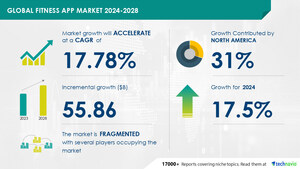NEW YORK, Sept. 24, 2024 /PRNewswire/ -- Report with the AI impact on market trends- The global plant-based meat market size is estimated to grow by USD 27.29 billion from 2024-2028, according to Technavio. The market is estimated to grow at a CAGR of over 36.92% during the forecast period. New product launches is driving market growth, with a trend towards changing consumer demographics. However, increasing consumption of animal meat poses a challenge. Key market players include Albertsons Co. Inc, Beyond Meat Inc., Conagra Brands Inc., Ecozone Ltd., Gathered Foods Corp., Green Monday, Hormel Foods Corp., Impossible Foods Inc., Jensen Meat Co., Kellogg Co., Kerry Group Plc, Kroger Co., Maple Leaf Foods Inc., Monde Nissin Corp., Nestle SA, New Wave Foods, The Kraft Heinz Co., The Tofurky Co. Inc., Tyson Foods Inc., and Unilever PLC.
Key insights into market evolution with AI-powered analysis. Explore trends, segmentation, and growth drivers- View the snapshot of this report
Plant-Based Meat Market Scope |
|
Report Coverage |
Details |
Base year |
2023 |
Historic period |
2018 - 2022 |
Forecast period |
2024-2028 |
Growth momentum & CAGR |
Accelerate at a CAGR of 36.92% |
Market growth 2024-2028 |
USD 27293.8 million |
Market structure |
Fragmented |
YoY growth 2022-2023 (%) |
27.84 |
Regional analysis |
North America, Europe, APAC, South America, |
Performing market contribution |
North America at 41% |
Key countries |
US, UK, Germany, Italy, and France |
Key companies profiled |
Albertsons Co. Inc, Beyond Meat Inc., Conagra |
Market Driver
The global health trend is driving consumer demand for nutritious food and beverage products. Chronic health issues like diabetes, digestive disorders, allergies, and obesity are on the rise, leading consumers to prioritize healthier dietary choices. These health-conscious consumers seek food with fewer calories but essential nutrients. Consequently, the demand for plant-based meat, as a healthier alternative to traditional meat, is increasing. The plant-based meat market is expected to expand significantly due to this consumer preference for healthier food options.
The plant-based meat market is experiencing significant growth due to increasing consumer interest in meat alternatives. Hormones, nitrates, and GMOs in animal-based foods are concerns for health-conscious consumers, driving demand for nitrite-free, hormone-free, and non-GMO plant-based options. Gluten, animal fats, and cholesterol are also major concerns for those following vegan or vegetarian lifestyles. Startup ventures are entering the market with innovative meatless meat products, such as veggie bacon, burger patties, nuggets, and strips. Hotels, fast food chains, and casual dining venues are partnering with these companies to offer plant-based options. Regulations and safety are crucial for the industry, ensuring food sustainability and animal welfare. Cruelty towards animals and portfolio diversification are also factors driving growth. Lobster, veal, and chicken alternatives are gaining popularity. Plant-based foods made from wheat, chickpeas, soy, corn, rice, and oats are in high demand. Impossible Foods, a leading player, is disrupting the market with its plant-based burger patty that mimics the taste and texture of meat. Consumer interest in plant-based diets and animal rights is fueling sales channel partnerships with retail chains. The future of the plant-based meat market looks promising, with continued innovation and consumer adoption.
Request Sample of our comprehensive report now to stay ahead in the AI-driven market evolution!
Market Challenges
- The global plant-based meat market may experience hindrances in growth due to the rising consumption of traditional animal meat and related products. This trend is anticipated to continue during the forecast period, driven by factors such as population growth, increasing disposable income, and the demand for protein-rich food items. Notably, major consumers of animal meat include the US, China, India, and Russia, with significant volumes of beef and veal in the US and large quantities of chicken in the US, China, Brazil, India, and Russia. Consequently, the expanding meat consumption may negatively impact the expansion of the plant-based meat market during the forecast period.
- The plant-based meat market faces several challenges in replicating the taste, texture, and aroma of animal-derived meat. Amino acid profiles must align with human body needs, ensuring proper water absorption, solubility, and emulsification. Anti-oxidation is crucial for shelf life, while fiber, Vitamin C, and Iron contribute to nutritious profiles. Plant-based chicken, pork, seafood, beef, and their refrigerated counterparts require careful formulation for texture and consistency. Food supply chain complexities, trade restrictions, and distribution in foodservice channels and retail sales add to the challenges. Online retailing channels offer opportunities but present new logistical hurdles. Health benefits, such as improved exercise performance, recovery, and muscle mass, are key selling points. Carbon footprint reduction is a significant advantage, but pea-based meat and soy-based meat face challenges in protein content and texture and consistency. Plant-based burgers, sausages, and the Impossible Burger's unique heme iron form need to look, sizzle, and satisfy consumers.
Discover how AI is revolutionizing market trends- Get your access now!
Segment Overview
This plant-based meat market report extensively covers market segmentation by
- Foodservice System
- 1.1 Frozen
- 1.2 Refrigerated
- 1.3 Shelf-stable
- Type
- 2.1 Plant based beef
- 2.2 Plant based chicken
- 2.3 Plant based pork
- 2.4 Others
- Geography
- 3.1 North America
- 3.2 Europe
- 3.3 APAC
- 3.4 South America
- 3.5 Middle East and Africa
1.1 Frozen- The plant-based meat market is experiencing significant growth as consumers seek alternative protein sources. Companies like Beyond Meat and Impossible Foods are leading this trend with innovative products that mimic the taste and texture of animal meat. These plant-based options are gaining popularity due to their environmental benefits and health advantages. The market is expected to reach USD74.2 billion by 2027, driven by increasing demand and advancements in technology. Businesses are investing in research and development to create more realistic plant-based meat options, further fueling market growth.
Download a Sample of our comprehensive report today to discover how AI-driven innovations are reshaping competitive dynamics
Research Analysis
Plant-based meat is a burgeoning segment of the food industry, driven by consumer interest in plant-based diets for health, ethical, and environmental reasons. Key ingredients include wheat, chickpeas, soy, corn, rice, and oats. These plants are transformed through processes like texturization, emulsification, and water absorption to mimic the taste, texture, and nutritional profile of animal-based meats like chicken, pork, beef, and seafood. Amino acids, solubility, viscosity, anti-oxidation, and emulsification play crucial roles in creating realistic plant-based meat alternatives. Companies are investing heavily in research and development to meet growing demand for these products, which offer the taste and texture of animal-based foods without the ethical concerns or environmental impact. The refrigerated plant-based meat market is a significant part of the food supply chain, providing sustainable and ethical alternatives to traditional meat products.
Market Research Overview
Plant-based food is revolutionizing the food industry with innovative alternatives to animal-based meats made from various sources like wheat, chickpeas, soy, corn, rice, oats, and more. Consumer interest in plant-based diets, driven by ethical concerns for animal rights and health benefits, is on the rise. These plant-based meats are engineered to mimic the taste, texture, and aroma of chicken, pork, beef, and even seafood, using techniques like water absorption, solubility, emulsification, and anti-oxidation. Soy-based meat, such as tofu and tempeh, and pea-based patties offer high protein content and nutritious profiles, benefiting human health. Plant-based meat products, including burgers, sausages, and nuggets, are now available in refrigerated form and through various retailing channels, including foodservice and online platforms. The food supply chain, trade restrictions, and food safety regulations are key considerations for the market's growth. The plant-based meat industry offers numerous health benefits, including fiber, vitamin C, and iron, and a lower carbon footprint compared to animal-based foods. However, concerns over genetically modified forms, hormones, nitrates, nitrites, gluten, animal fats, and cholesterol persist. Startup ventures and established foodservice providers, including hotels, fast food chains, and casual dining venues, are embracing meatless meat products to cater to the growing demand for plant-based options.
Table of Contents:
1 Executive Summary
2 Market Landscape
3 Market Sizing
4 Historic Market Size
5 Five Forces Analysis
6 Market Segmentation
- Foodservice System
- Frozen
- Refrigerated
- Shelf-stable
- Type
- Plant Based Beef
- Plant Based Chicken
- Plant Based Pork
- Others
- Geography
- North America
- Europe
- APAC
- South America
- Middle East And Africa
7 Customer Landscape
8 Geographic Landscape
9 Drivers, Challenges, and Trends
10 Company Landscape
11 Company Analysis
12 Appendix
About Technavio
Technavio is a leading global technology research and advisory company. Their research and analysis focuses on emerging market trends and provides actionable insights to help businesses identify market opportunities and develop effective strategies to optimize their market positions.
With over 500 specialized analysts, Technavio's report library consists of more than 17,000 reports and counting, covering 800 technologies, spanning across 50 countries. Their client base consists of enterprises of all sizes, including more than 100 Fortune 500 companies. This growing client base relies on Technavio's comprehensive coverage, extensive research, and actionable market insights to identify opportunities in existing and potential markets and assess their competitive positions within changing market scenarios.
Contacts
Technavio Research
Jesse Maida
Media & Marketing Executive
US: +1 844 364 1100
UK: +44 203 893 3200
Email: [email protected]
Website: www.technavio.com/
SOURCE Technavio

WANT YOUR COMPANY'S NEWS FEATURED ON PRNEWSWIRE.COM?
Newsrooms &
Influencers
Digital Media
Outlets
Journalists
Opted In




Share this article